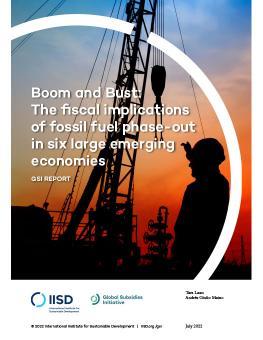
https://www.iisd.org/articles/press-release/six-fossil-fuel-dependent-ec...
July 7, 2022—As the global clean energy transition gathers pace, six emerging economies need to start adjusting their fiscal policies now to account for declining fossil fuel use—or risk a USD 278 billion gap in revenues by 2030, equivalent to the combined total government revenues of Indonesia and South Africa in 2019, according to a new report by the International Institute for Sustainable Development (IISD).
Titled Boom and Bust: The Fiscal Implications of Fossil Fuel Phase-Out in Six Large Emerging Economies, the report spotlights heavy dependence on fossil fuel revenues in Brazil, Russia, India, Indonesia, China, and South Africa (BRIICS). It argues that this economic reliance puts BRIICS countries at risk of experiencing a substantial revenue gap over the next few decades, as the world transitions from fossil fuel-based energy systems to cleaner energies to limit global warming to 1.5°C.
The study finds that by 2050, overall fossil fuel revenues in BRIICS countries could be as much as USD 570 billion lower than a business-as-usual scenario where governments fail to phase down fossil fuels enough to avoid the worst climate impacts. The widest gaps are expected to occur in India (USD 178 billion), China (USD 140 billion), and Russia (USD 134 billion).
The report finds that public revenues from fossil fuel production and consumption currently account for a staggering 34% of general government revenue in Russia, 18% in India, and 16% in Indonesia. The share stands at 8% in Brazil, 6% in South Africa, and 5% in China. This includes only direct, first-order, government financial revenues—fossil fuel dependence would be much larger if considering private incomes and flow-on effects in these economies.
But these revenues are not only unreliable and erratic—according to the authors, they are also undermined by the negative economic impacts of fossil fuel use, such as health costs due to air pollution and damage from climate change. In fact, IISD’s previous research has shown that in many of these countries—including India and South Africa—these externalities far exceed public fossil fuel revenues.
“To prevent devastating climate change, the world has to phase out the production and consumption of fossil fuels, which will inevitably erode related revenues. Emerging economies have an enormous opportunity to build more resilient and economically sustainable energy systems as they decarbonize—but they must plan ahead to avoid shortfalls in public revenues that could reverse progress on poverty eradication and economic development,” says Tara Laan, Senior Associate at IISD and lead author of the report.
This economic planning can be done in climate-positive and socially progressive ways, such as by removing subsidies from—and increasing taxes on—fossil fuels in ways that don’t hurt the poor—like export duties and windfall profits taxes, as imposed by India last week. The eventual fall in global energy prices will be an opportune time to impose carbon pricing, IISD experts say. Diversifying income streams—such as new targeted taxes in the energy and transport sectors—will also ensure that addiction to fossil fuel revenues does not become a barrier to reform.
History has shown that even large reductions in fossil fuel revenues can be sustained by rapidly developing other economic sectors: in Indonesia, the government’s oil and gas revenues fell from 35% of total revenue in 2001 to 16% in 2019, while the country’s GDP growth and budget deficit remained largely unchanged.
“Surging energy prices and demand are generating huge revenues from fossil fuel production and consumption. These temporary, short-term windfall profits should be taxed to fund the energy transition, which, in turn, will boost energy supplies, create green jobs, contribute to economic growth, and ultimately, increase government revenues,” Laan says. “At the same time, governments must protect vulnerable consumers from high prices and support fossil fuel-dependent workers and communities in ways that don’t hinder the transition to cleaner energy.”
Note: Though the report does not directly assess the implications of these findings in light of Russia’s war in Ukraine, it provides further evidence that Russia’s fiscal system is highly vulnerable to changes in fossil fuel demand and supply.
Media Contacts
Tara Laan, Senior Associate, IISD: tara.laan@iisd.net
Aia Helena Brnic, Communications Officer, IISD: abrnic@iisd.org










Add new comment